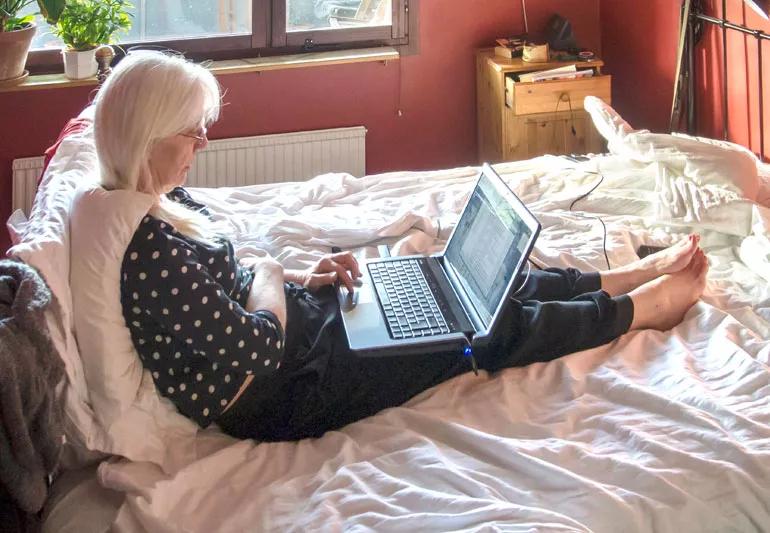Here’s how working from bed impacts your health

If you work from home full time or if you’re still navigating remote work due to the coronavirus pandemic, it can be tempting to work from bed from time to time. And who wouldn’t love to cozy up in bed while on a conference call? Or maybe you don’t have a dedicated workspace at home, so you’ve decided to make your bed your makeshift office.
Advertisement
Cleveland Clinic is a non-profit academic medical center. Advertising on our site helps support our mission. We do not endorse non-Cleveland Clinic products or services. Policy
Unfortunately, this habit or ritual might cause you more pain than productivity.
“I wouldn’t recommend it and I would try to avoid it at all costs because there’s going to be a lot of negative consequences that come with it,” says chiropractor Andrew Bang, DC.
Medical providers agree that working from your bed could disrupt your sleep schedule and actually make you less productive. Not to mention it can wreak havoc on your posture – causing you annoying aches and pain that could be avoided from a proper workplace setup.
Mixing work with your bed is a little bit like merging church and state.
The bedroom should be a relaxing environment that promotes sleep. If you start working from bed on a regular basis, your brain can start to associate your bed with work. This can have a negative impact on your sleep when you’re trying to unwind for the night, but your brain is struggling to switch from work mode to bedtime.
There’s also research that points out how looking at your phone or other devices right before bed can delay sleep because of the blue light they emit. So if you’re burning the midnight oil and working late from bed, you might have more trouble falling asleep.
Blurring the lines between downtime or personal time and work might also cause you to be less productive, especially if you’re working in a dark bedroom surrounded by fluffy pillows and blankets.
Advertisement
Maybe you’re just not feeling well or a crowded house makes it hard to find peace and quiet for an important phone call.
“If you simply must work from bed for whatever reason, at least be smart about it,” says Dr. Bang.
Often time’s when people work in bed they twist and strain to get into a position where they’re lying down but still able to see the screen or reach the laptop. Unfortunately this can lead to more aches and pain.
“Proper ergonomics of your workspace should always have your spine in as neutral position as possible,” says Dr. Bang. “Your setup should always make sure your head, arms and back are in the right, neutral position and you should incorporate movement throughout your day.”
These four components are the golden rules of a proper workplace setup, which your bed doesn’t necessarily lend itself to.
In the end, the best position to work from bed is on your back and with a tablet (not a laptop).
Don’t lean up against the headboard or wall because it’s going to overstretch the back side of your muscles, which include your hip flexors. We tend to sit so much throughout the day already that our hip flexors are naturally tight, says Dr. Bang. Additional stretching can cause more pain as it’s going to pull directly on the lumbar spine and the next thing you know your back is aching.
“Hold the tablet above your head and rest your elbows on either side of you,” explains Dr. Bang. “It’s best to avoid pillows so your neck isn’t flexed, but if you absolutely must, use one small pillow underneath your neck.”
Then, make sure to move often. Roll to your side and put the tablet on the bed and work from that side. Then switch and rotate to your other side. Keep moving as much as you can and set a timer to get up every 45 to 60 minutes to stretch.
Advertisement

Sign up for our Health Essentials emails for expert guidance on nutrition, fitness, sleep, skin care and more.
Learn more about our editorial process.
Advertisement

Try breaking down tasks into manageable to-do lists and relying on time management techniques

Working beyond your limits can increase illnesses and accidents related to your physical and mental well-being

Help calm the angst that can come with the start of a new work week by adopting a positive mindset, planning an activity and getting some exercise

Taking a stand throughout the day can lower your risk of disease while improving your energy, focus and productivity

A hostile work environment can foster a culture of aggression, doubt and negativity that’s harmful to your health and success

Not having paid sick leave, working night shifts and lacking consistency in schedule or pay can cause serious psychological distress

Schedule breaks, stand and stretch, and rely on alarms, to-do lists and other tools to help keep you focused

Work burnout can leave you exhausted and frustrated at work and beyond, but you can beat it by setting boundaries and surrounding yourself with positivity

Even small moments of time outdoors can help reduce stress, boost mood and restore a sense of calm

A correct prescription helps your eyes see clearly — but as natural changes occur, you may need stronger or different eyeglasses

Both are medical emergencies, but they are very distinct events with different causes